Opinion
Relevance of past in planning future
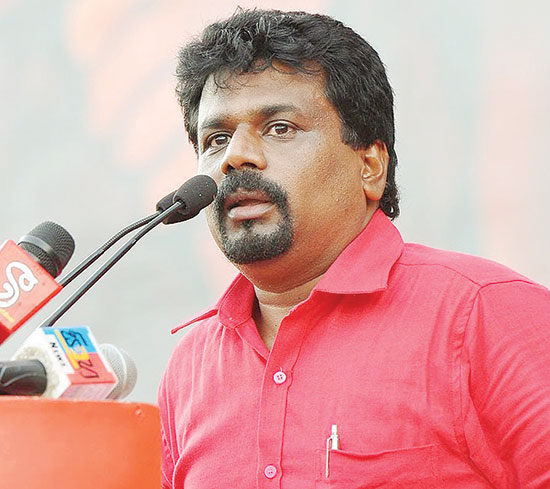
Sri Lanka is undergoing perhaps the worst existential crisis since independence. We are on the verge of financial bankruptcy. With the rulers appearing both rudderless and clueless in sorting out the many complex issues that arise on a daily basis, the country is rapidly and surely moving towards an abyss. Masses are losing faith in democracy which is being manipulated to their own advantage by those who have tasted unbridled power over the years. The rulers appear to be gathering their forces to confront a likely uprising of the starving masses, by bringing in the armed forces to the forefront for civilian administration. The priority of the ruling family appears to be to ensure their continued dominance in all aspects. The behaviour and utterances of members of the so called “Royal Family” show that they are living, at our expense, in an entirely different world, far removed from the suffering masses. Their subservient ministers come out with absurd statements that are an insult to the intelligence of the people. Almost every day we hear of a new episode of corruption amounting to billions. The commissions appointed to investigate them at a tremendous cost to the taxpayer, produce reports the contents of which the people are hardly aware of and the rulers do not appear to read even. While many culprits have been identified, no action has been taken, reportedly because those in power are also involved as co-conspirators.
While the government is talking of adjusting its way forward, it is very unlikely that any meaningful course correction is possible without a radical change in thinking and the personalities. Changing parties at every election has been an exercise in futility. Both major parties and their offshoots have been in government with nothing much achieved and themselves responsible for corruption, to deserve a return to power. The main opposition parties appear disorganized without putting forward a definite programme for recovery. There is no apparent attempt at a consensus for toppling a dominating regime. As corruption and spreading racial disharmony remain two of the main obstacles to development, it is prudent to look towards a grouping which has a clean record as far as these issues are concerned.
Though I have never been a sympathiser of the JVP, it appears that they deserve to be given a chance to show them practice all the right things they have been preaching. The fact that they never abused public property, like vehicles, official residences even during the brief period they were in government, should be borne in mind. Their leaders have been very truthful and loaded with correct facts when they expose every dirty deal of those in power. None of the facts and figures they came out with have been disputed so far. In parliamentary debates they have been speaking to the point despite many wild distractions attempted by the opposing groups in government. In the recent budget debate, as always, it was exemplary how they came out with myriads of true statistics to prove their arguments on diverse subjects. The public kept in the dark by the rulers should be ever so grateful to the JVP leader for exposing the treacherous Yudaganavi deal.
Their policy document as developed by the NPP gives a very accurate analysis of the current problems and practical long term solutions. I am impressed by their faith in government regulated private enterprise, private education and healthcare services while strengthening the role of the state in all these sectors to benefit all layers of society. They are the only party to promise getting rid of unnecessary perks for parliamentarians like pensions and vehicles and maintenance of ex presidents.
The main brickbats directed at them are based on the two youth rebellions, the last one over three decades ago. No one should condone that. There are many families who still mourn their kith and kin brutally killed during that tragic period. I do not wish or feel competent enough to analyse what led to that unfortunate episode. Ever since then, they are playing a vital role in espousing democratic principles with not an iota of evidence that the party is likely to return to such atrocities. Apart from a few ageing members with no active role in the party activities at present, the current leadership has not been involved or justified what happened then. It was encouraging to hear the JVP leader recently expressing his regret about the immense hardship and suffering to the people, while stating that they were forced into violence by dictatorial regime of the day, who continued to ignore the plight of the youth. The current state of affairs with gross unemployment, youth unrest and financial bankruptcy would retrospectively justify what they were trying to impress upon the rulers then though there is no doubt that the method adopted was unacceptable in a democracy.
It has become a favourite pastime for parliamentarians from the ruling party to question the number of buses, transformers and other public property set on fire by the rebels, during three or four months of the rebellion. It should be understood that such action was by misguided, enraged youth with the mistaken belief that they were going to change the prevalent unjust social structure. It is conveniently forgotten how the white clad “gentlemen” of the ruling clans preaching democracy and professing patriotism systematically fleeced the country over several decades by fraud leading to the imminent bankruptcy. Billions of dollars suspected to be hoarded abroad if repatriated could pay back most of the foreign debt the country is burdened with.
I am only a keen observer, not an affiliate of any political faction. At every election I have voted purely on the merits of the party policies considering the issues that prevailed at that particular time. Although, like many of my acquaintances, I always hoped the JVP would have a strong representation in the opposition, I could never bring myself around to vote for them. A rethink on this aspect is now opportune. My observations show that in the same way Viyathmaga gathered momentum before the last election, there is increasing enthusiasm of the educated youth and the middle classes towards the forces headed by the JVP. The formation of the National People Power (NPP) has allowed a wider circle of the educated people to gather round them with the sole purpose of saving the country from falling into an abyss. However It is unrealistic to expect their current meager 3% vote base could be turned into a winning majority in the short term. But they deserve a strong representation in government where they will be an effective force to reckon with. JVP should discard their avowed stand not to cooperate with larger political groupings. Although a coalition with those groups may be against their basic policies, a working arrangement as happened in 2015 is mandatory if any success is to be achieved. Their history of not getting actively involved in government by not accepting portfolios makes them only sideliners or onlookers with no practical role to play and nothing concrete achieved at the end. Instead, with a strong representation in the parliament, they should seriously consider becoming a partner of a government which they can leave with honour if they are not happy with the progress. By now they should have realised that making noises from the opposition has not made much difference to the sorry plight of the masses. Instead they are being castigated as a party for the opposition only.
As I have stated in my earlier articles, democracy may not be the ideal system of governance for a society with wide discrepancies in the distribution of wealth resulting in abject poverty for a significant proportion of the population. The electorate is being blamed by pundits for the poor selections of representatives made at every election. But what choice have they got other than voting for the one who has given or promised them a few provisions for the next meal or some building material for a roof over their heads? The fact that the political novice, a close relative of the ruling family, who headed the list of preferences in the Matara District at the last election, had spent around Rs. 50,000.00 for every vote received (whose money I wonder) and overtook well known respected veteran politicians with fewer resources illustrates this point.
Thus what I suggested above is a possible solution to the immediate problems. A radical change in the system of governance is the ultimate necessity.
Free Thinker
Opinion
Government by the people for the people: Plea from citizenry
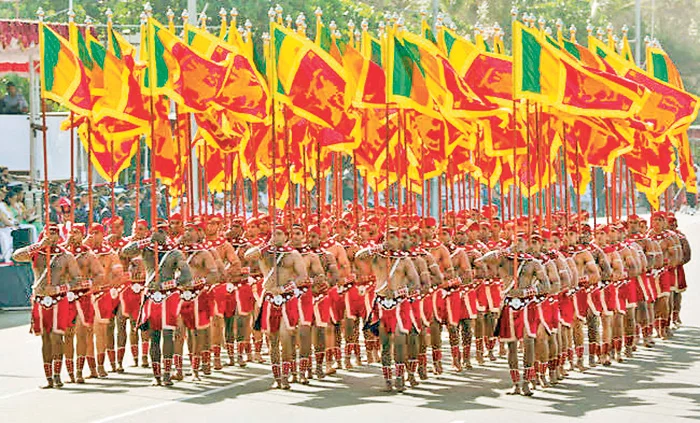
By an Old Connoisseur
The incumbent rulers keep on reminding the people, ad nauseam, that the current administration is a government for the people by the people. They have claimed the current government was born out of the uprising of the people.
All governments in democratic societies are born out of the will of the people. In such a context, all such governments have to work towards the well-being of the people with undiluted commitment. There is no doubt in the minds of even the most discerning citizens of Sri Lanka that all these promulgations are indeed the most noble of objectives and one would justifiably expect such contentions to even warm the cockles of the hearts of all and sundry.
Yet for all this, we do need to remember and firmly reiterate to our politicians that this principle should be the bedrock on which the political governance of any democracy is based. The people of a country should come first and foremost in all considerations of any legally elected democratic government. True enough, we do know for sure that even despite the very loud vocal grandiloquence of all previous governments, and I repeat all previous governments, they did not go even a little distance to hold the welfare of the people to be sacred, and their deeds and interests were completely at loggerheads with such an honourable foundation as well as essential and admirable attitudes. Without any significant exceptions, all previous political systems over the last 77 years of independence of our much-loved Motherland, have gone on record as institutions that put themselves first in all their considerations.
In point of fact, we also have to agree even unequivocally that this noble task cannot be achieved by the politicians alone. Politicians will have to take steps to stimulate, facilitate and unite all sections of society so that our people will put their collective shoulder to the wheel in a concerted initiative to lift up this country from the mire into which it has been pushed by politicians of various hues. Delving deeper into the depths of this contention, the question arises as to what or who are understood as people. In any society when one talks of people, we should focus on all people; the rich and the poor, the able and the disabled, the educated and the not so well educated, the employed and the unemployed, public-sector workers and the private-sector workers, the farmers as well as the white-collar workers, government enterprises as well as community organisations, and the business enterprises; in fact, the whole lot of Homo sapiens in our country. To improve the well-being of people we need the participation and unstinted cooperation of all these groups in our populace. An abiding sense of patriotism in the psyche of all of our people is definitely the need of the hour.
Politicians lay down the policies and the public sector ensures the implementation of these rules and regulations to improve the wellbeing of people. The public sector, including all politicians of different sorts, are servants of the people and are not deities with unlimited power just to take care of themselves and their political institutions as well as their kith and kin and acolytes. To realise these exalted goals we have to ensure that we have certain universal rules including respect for our people at all times, fair distribution of resources in an equitable manner, kindness, empathy and respect for the freedom of others, preservation and conservation of nature and the environment, adherence to the rule of law, unmitigated compliance with basic human rights and dignity, as well as the development of those very fine humane attributes such as beneficence, non-maleficence and altruism.
If we are to develop by transforming society by the people for the people, we will have to internalise and translate these attributes in our behaviour all the time and in all sectors of the community. Political leadership alone cannot do this honourable task. Society has to unite under these values and other attributes to be articulated and facilitated by the leadership. This is what many other progressive countries have attempted, some of them forging ahead with great success. For this to happen the entire society will have to work together over a long time with respect and minimal adversity. The stakeholders for this endeavour would be all individuals of society, Public Service including the political leadership, Private Sector and their leading figures and Community Organisations including their management. Every member of the population of our wonderful country should be invited to put his or her shoulder to the common wheel in a trek towards prosperity to enable everybody to enjoy an era of opulence.
The most admirable theme for the celebrations of our independence on the 4th of February this year was “Let us join the National Renaissance”. It was a clarion call to enable us to rise up like the proverbial phoenix from the ashes towards a magnificent revival. In addition to all that has been written above, the government and its leadership, for their part, have an abiding duty to take all necessary steps to facilitate the revitalisation of patriotism to urge the populace to contribute to the prospect of national resurgence. Towards that end, the general public has to be happy in this thrice blessed land and they need to live in a country that is safe and affluent. The powers that be need to realise most urgently that unless corruption is completely eliminated, the drug lords effectively neutralised, murderers and other law-breakers swiftly brought to book, various Mafia-type impertinent audacious organised collectives such as Rice Millers, Egg Manipulators, Coconut Wheeler-dealers, and Private Transport Syndicates; all of which hold the public to ransom, are ruthlessly tamed, there is no way in which we can rise and march towards any kind of Nationwide Resurgence. Of course, equally importantly, the farmers who provide sustenance to the entire nation should be looked after like royalty. It is also ever so important that vital and purposeful steps are taken to develop the rural impoverished areas and take steps to alleviate the poverty of the downtrodden. If these things are not attended to, at least for a start, the grandiose but implausible and tenuous rhetoric of that call to rally would just be a ‘pus vedilla’, and could even be a virtual non-starter.
Opinion
Save Sri Lanka’s majestic elephants
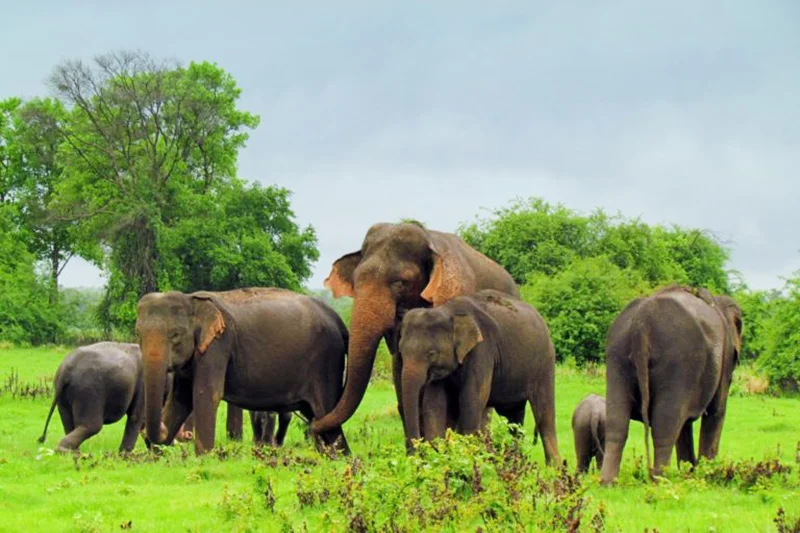
As practising Buddhists and animal lovers, both my wife and I believe all living beings are entitled to share our planet in harmony as they too feel pain like us and need protection from natural and more importantly, man-made disasters! It is in this context, I wish to highlight these tragedies becoming all too common through your esteemed journal. If I succeed in terms of creating greater public awareness which hopefully, make an impetus to drive forward things to make it happen, I will be a a happy man! Turning a blind eye is not an option knowing full well our elephant population is on the decline! Can we afford it? Certainly not! Our Buddhist monks can easily be right at the fore front rather than keeping elephants tethered to trees in temple precincts just for prestige values!
While recognising the sad truth about human elephant confrontations leading to death and destruction for both, there must be practical solutions to end it together with herds including young calves being killed by trains!
There should be mandatory slow speed limits to enable train drivers to stop when these magnificent creatures are trying to cross ! Here in Wales, UK we have 20 and 30 MPH speed limits monitored by cameras to ensure health and safety of the public! Why not adopt the same system for our national heritage? Impose hefty fines for law breakers!
The Sri Lankan elephant (Elephas maximus maximus) is native to Sri Lanka and one of three recognised subspecies of the Asian elephant. It is the type subspecies of the Asian elephant and was first described by carl Linnaeus under the binomial Elephas maximusin 1758. The Sri Lankan elephant population is now largely restricted to the dry zone in the north, east and southeast of Sri Lanka.
Elephants are present in famous Yala, Willpattu National Park and Minneriya National Park amongst others but also live outside protected areas. It is estimated that Sri Lanka has the highest density of elephants in Asia. Human-elephant conflict is increasing due to conversion of elephant habitat to human settlements and permanent cultivation. Elephants are classified as mega herbivores and consume up to 150 kg (330 lb) of plant matter per day. As generalists they feed on a wide variety of food plants.
In Sri Lanka’s northwestern region, feeding behaviour of elephants was observed during the period of January 1998 to December 1999. The elephants fed on a total of 116 plant species belonging to 35 families including 27 species of cultivated plants. More than half of the plants were non-tree species, i.e. shrub, herb, grass, or climbers. More than 25% of the plant species belonged to the family Leguminosae and 19% of the plant species belonged to the family of true grasses. The presence of cultivated plants in dung does not result solely due to raiding of crops as it was observed that elephants feed on leftover crop plants in fallow chenas. Juvenile elephants tend to feed predominantly on grass species. Food resources are abundant in regenerating forests but at low density in mature forests. Traditional slash-and-burn agriculture. creates optimum habitat for elephants through promoting successional vegetation.
Females and calves generally form small, loosely associated social groups without the hierarchical tier structure exhibited by African bush elephants. However, at some locations such as Minneriya National Park hundreds of individuals aggregate during the dry season, suggesting that grouping behaviour is flexible and depends on season and place. Please campaign hard and tirelessly to achieve our noble goal!
Sunil Dharmabandhu
Wales, UK
Opinion
Humane capitalism needed to generate national wealth
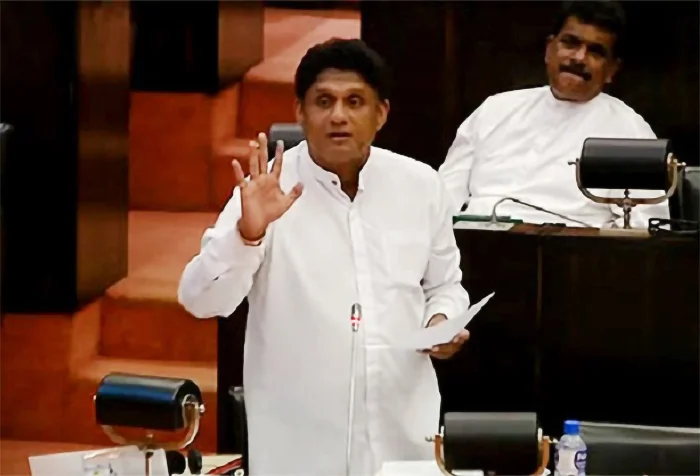
(Text of Opposition Leader Sajith Premadasa’s speech in Parliament during the ongoing debate on Budget 2025)
When analysing the solutions that the 2025 Budget should provide for the country, it is crucial to examine the mandate given to implement such a budget and how that mandate has been executed.
The policy framework presented to secure the mandate was “A Thriving Nation – A Beautiful Life” and “Country to Anura”. We must assess how much of these policy features are reflected in the 2025 Budget.
Looking at the budget framework, its presentation, and its unveiling, it is clear that this budget does not align with the promises made or the mandate received. I would like to substantiate this argument with evidence, data, and facts.
On page 105 of the ” A Thriving Nation – A Beautiful Life” policy document, there is a commitment to conduct an alternative debt sustainability analysis when the current government came into power. What has happened to that promise? Instead, what we see today is an unbearable burden and hardship imposed on the people, with the benefits they deserve being severely restricted.
Under the 2024 Fiscal Management (Responsibility) Act, primary expenditure is capped at 13% of GDP, and the primary balance is limited to 2.3% of GDP. Such limits are imposed in only about 10 countries worldwide, including Guatemala, Ethiopia, SriLanka, Venezuela, Nigeria, Yemen, Bangladesh, Lebanon, and Haiti.
Capping primary expenditure at 13% of GDP and maintaining a primary balance at 2.3% of GDP were not election promises of this government. This is not the execution of a mandate; it is a surrender of the mandate. It is a destruction of the mandate, forgetting what was promised, and entering into harsh and oppressive agreements with the International Monetary Fund (IMF) and sovereign bondholders.
This does not mean we advocate for withdrawing from the IMF program. Instead, we believe in entering a new, more people-centric and humane path that prioritizes the welfare of people.
These fiscal limits make it impossible to correct for externalities or address social costs. The responsibility of a government is to provide public goods, and these limits hinder that. They also restrict social redistribution. International studies show that capping primary expenditure and primary balances is counterproductive to a country’s development. Yet, the government has ignored all this, renegotiated agreements, and entered into new ones.
In essence, the government, which came to power with the people’s mandate, has completely surrendered that mandate.
I remember a statement made by President John F. Kennedy: “The great enemy of the truth is very often not the lie, deliberate, contrived, and dishonest, but the myth, persistent, persuasive, and unrealistic.” This statement holds great relevance today.
Many people are lamenting that they do not understand the increase in salaries. There is confusion about what will happen to allowances and how they will be structured. We must understand this confusion. This budget has been prepared within the constraints of 13% primary expenditure and a 2.3% primary balance of GDP. In reality, the amount of funds available to rebuild the country and empower the people is very limited.
We have met with the International Monetary Fund (IMF) on several occasions. I, along with Minister Harsha de Silva, Minister Kabir Hashim, Minister Eran Wickramaratne, and others, have clearly stated that we are working with the IMF and that we are moving forward with their program. However, we do not dance to their tune. We acknowledge that the IMF program creates hardship and burdens, and there are costs involved. But we must minimize these hardships and burdens as much as possible.
Yet, the President comes to Parliament and says that we must forget all the promises made on election platforms, forget the people’s burdens, tears, and pain, and ignore all these difficulties. He claimed then that by November 2024, the country’s economy would face significant shocks. The President is taking over the agreements negotiated by the previous Ranil Wickremesinghe government wholesale.
We see this as a betrayal of the people’s mandate. On one hand, it is a betrayal of the people, and on the other, he speaks of the lost decades. Will we lose another decade due to this decision? We could have made a better, more beneficial decision for the country—one that reduces burdens instead of increasing them, provides relief instead of hardship, and offers some solution to the people’s cries.
The President has firmly stated in this House that they will be ready to repay our debt by 2028. That is a good thing. Our hope is that we can achieve this. However, we do not endorse the tribal political culture that creates crises within the country and transfers power. To repay the debt by 2028, it is essential to boost economic growth and increase state revenue. There is a fact that no one talks about, and many are hiding it.
Since 1975, 75 countries have implemented IMF agreements. Of these 75 countries, 59% have inevitably had to enter second, third, and fourth debt restructuring programs. No one talks about this or informs the public. Only 41% of countries have successfully managed their affairs with a single agreement and debt restructuring. Honestly, I hope we are among that 41%. I pray that we do not have to undergo another debt restructuring. If that happens, it will lead to a severe economic collapse.
Our country should have stayed on the path of debt sustainability, but it has deviated from that line. Our country needs a higher economic growth rate and a faster rate of increasing state revenue. Otherwise, we will have to undergo another debt restructuring.
This revelation came to light during discussions I participated in with a team that advised the previous government until the last moment on formulating the current IMF agreement and sovereign bond agreements.
Even if we cannot stay on the debt sustainability line, we may have to undergo a second or third debt restructuring. If that happens, Sri Lanka will face a global crisis. To prevent this, the country’s economy must grow, and state revenue must increase.
The President stated in his budget speech that they would achieve a 5% economic growth rate in 2025. That would be good if it can be achieved. However, the President’s speech mentions that according to the World Bank, our country’s poverty rate is 25.9%. These are the statistics presented by the President in the budget speech. But while the President accepts the World Bank’s poverty statistics, the World Bank states that the economic growth rate in January 2025 will be 3.5. The President has accepted the poverty rate of 25.9% while citing World Bank statistics.
According to the President, the economic growth rate is 5%. The World Bank states that the economic growth rate in January 2025 will be 3.5%. There is a deficit in the economic growth rate. If this deficit is not bridged, we will fall into difficulty. As a country, we must definitely move towards rapid economic growth. However, this budget does not clearly indicate how this will be achieved.
Similarly, we need to increase our Gross Domestic Product. This budget has not provided any clarification regarding expenditure methodology, revenue methodology, and production methodology. There is no clarity in this budget about how to maintain a high economic growth rate to begin debt repayment in 2028. We must be realistic in presentation.
The whole country is complaining today because of the wrong agreement reached on the primary balance and primary expenditure. There is confusion about salary increases and no clarity. There is no clarity about how salaries will be received by grades. There is no clarity about how much will be received this year and next year. There is confusion everywhere. There is no explanation about salary increases.
There should be a clear explanation of how the economy will grow rapidly. There should be a clear explanation of how to increase state revenue. The agreement with the International Monetary Fund and the International Sovereign Bond agreement have been entered into based on several scenarios. The scenario used as the basis for this is completely wrong. That’s why we stated that an agreement should be reached. This process created based on the agreement has created an unrealistic target that cannot achieve the economic growth rate. They have agreed to an unrealistic target regarding state revenue. The main reason for this is that the current government also agreed to a weak agreement. The current government is following in the footsteps of the former President.
During the period of electing 159 MPs, they should have discussed with the International Monetary Fund and international sovereign bondholders to change the signed agreements and move to a new agreement that would put less pressure on the people, provide more relief, less distress, and more strength. I request that they consider this even now.
I request immediate discussions with the International Monetary Fund. The economic growth targets are not realistic. State revenue targets are not realistic. Primary balance and primary targets are not realistic. The country will have to go for a second debt restructuring before debt repayment in 2028. This is a serious situation. The government is heading towards a very difficult destination. The government is heading in the wrong direction.
I was shocked to hear what the team that advised on creating the International Monetary Fund agreement and International Sovereign Bond agreement said. It hasn’t even been three months since discussing the end of the agreement. They say we need to go for debt restructuring again. These are not jokes. It’s our country’s people who face distress and pressure from these. Through domestic debt restructuring, they tapped into the Employees’ Provident Fund. Why can’t the current government bring a proposal to Parliament to do justice to the Employees’ Provident Fund and Employees’ Trust Fund?
Similarly, Aswesuma is not a solution for eliminating poverty. There should be a production program, consumption program, savings program, export program, and investment program to eliminate poverty, but none of these exist. The selection for and exclusion from the Aswesuma program are done without identifying the poverty line and without conducting a household income-expenditure survey. It has been done without knowing information about poverty as well as food and non-food expenses. How can a poverty elimination program be implemented that way?
There are several serious problems with the limitations the government has created. There is serious confusion in every service including teachers, doctors, nurses, workers, and office employee (KKS) staff. The government has been unable to provide the promised Rs. 20,000 salary increase. The limited primary expenditure limit is thirteen percent. The primary balance is limited to 2.3. Within this limit, the government cannot implement the promised “A Thriving Nation-A Beautiful Life” policy statement. Within these limited resources, you have placed the necessary limitations yourself to not implement this, and you have become a prisoner yourself.
The elderly retired community used to receive 15% interest on their Rs. 1.5 million savings. That saving has now been reduced to one million. The savings interest rate is only about 10%. This is a serious problem for the elderly community. Various benefits have been provided for women. That’s a good thing. But the most serious problem has become labor force participation. It’s thirty-four percent. We should work to bring that to 45%. Verite Research has prepared data-centric proposals to implement maternity allowances with state patronage. It costs about six to seven billion rupees. If such an amount is spent, women’s labor force participation can be brought to a higher level.
Tax money from alcohol and cigarette manufacturing companies is not being properly collected. A wrong tax formula is being implemented. The government should look into this and work to increase state revenue.
There are several proposals to help the pre-school system. It has been proposed to increase pre-school teachers’ allowances. But there are very few pre-schools in the public service. Don’t implement it selectively. It should be implemented as a comprehensive program. We are happy about the increase in Mahapola scholarships. The Mahapola scholarship hasn’t even been paid for the past few months. The government has announced increasing an allowance that hasn’t been paid. I believe the government will work to pay both the increased Mahapola allowance and the unpaid Mahapola allowance.
Farmers are currently under severe pressure. Not just the paddy purchasing process, but the purchasing process of other crops has not been properly implemented. I’m not making this accusation against the government. No previous government had a proper cultivation formula with a clear cycle. This should be legislated. It should be legislated through a Parliamentary act.
The fishing community is waiting for the fuel subsidy. Many fishermen have become destitute. We talked about the wages of the Malayaha community. We believe we need to go beyond that. That Malayaha community has no land ownership, no house ownership. They should be empowered by giving them ownership of cultivation and lands, and the right to live in their own house. This community should be transformed into small tea estate owners who contribute 60% of production by utilizing 40% of the country’s land within the national production, with their own small tea estate in this country.
A sustainable solution should be provided to the unemployed youth community too by distributing some portion of uncultivated land. More than increasing salaries, such a process adds something to national production.
Many people are waiting for appointments after training as nurses. The family health sector is the same. There are about thirty-five thousand graduates. The President has promised to prepare a proper program for 35,000 graduates. Please don’t forget the promise given to unemployed graduates. Work to implement that too.
The current government hasn’t made any systemic changes. The Gotabaya-Mahinda Rajapaksa system hasn’t changed. Projects are implemented according to the government’s wishes. Political victimization is happening severely. Mahinda Weerasuriya was the Chief Secretary of Sabaragamuwa Province. Now he has retired. Mrs. Deepika, the Chief Secretary of the North Western Province, and Mrs. Damayanthi Paranagama, the Secretary of Uva Province, have been removed from their Chief Secretary positions. Nandana Galagoda, the Nuwara Eliya District Secretary, has also been removed. Mr. Wasantha Gunaratne has been removed from the position of Ratnapura District Secretary. Ganesh Amarasinghe has been removed from the position of Matara District Secretary. Why are they doing this? People didn’t vote for you to carry out such political victimization. This is wrong. Stop the victimization immediately.
I hope this budget will be successful. We will also support implementing the positive, people-friendly provisions in it. We will be a strength to add value to the country. Please let’s work with a mindset of providing decentralized funding. Let’s work under a new program. This budget shows no understanding of the external environment.
We need to diversify our export market. We depend on just a few exports. There is potential to create diversification in export destinations in other power regions of the world. There are no details about this in the budget. Foreign direct investment must necessarily be brought to our country to rebuild it. A special program should be implemented for this. We are ready to support this. We must compete with other countries in the world. I don’t see a clear program for this within this budget speech.
Within our political policy, in the ten-fold methodology we follow, we follow a social democratic program. Through this, humane capitalism is needed to generate wealth in the country. Limited state intervention is needed to correct the imbalances that occur within humane capitalism. While protecting the welfare state and increasing its efficiency, more action should be taken to provide resources to it. A results-oriented and time-bound poverty eradication program is needed. A balanced economic growth rate should occur at the Divisional Secretary level across all nine provinces of the country. An agriculture sector, fisheries sector, and industrial sector enriched with new technology should be created. All people should be empowered as Sri Lankans without discrimination. Democracy should be strengthened. Sustainable development should be strengthened. Foreign relations that add value to the country should be implemented. This ten-fold program is the program we follow. Standing within that framework, we will provide our strength to build this country.
-

 Business3 days ago
Business3 days agoSri Lanka’s 1st Culinary Studio opened by The Hungryislander
-

 Sports4 days ago
Sports4 days agoHow Sri Lanka fumbled their Champions Trophy spot
-
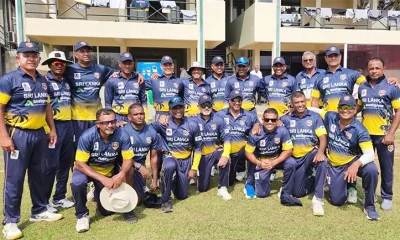
 Sports7 days ago
Sports7 days agoSri Lanka face Australia in Masters World Cup semi-final today
-

 News7 days ago
News7 days agoCourtroom shooting: Police admit serious security lapses
-
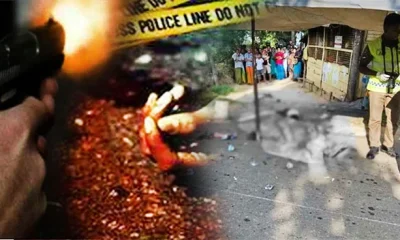
 News7 days ago
News7 days agoUnderworld figure ‘Middeniye Kajja’ and daughter shot dead in contract killing
-
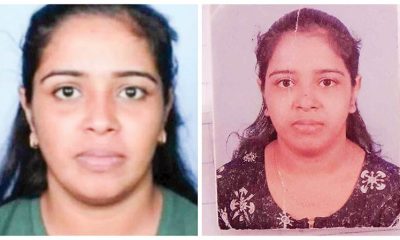
 News6 days ago
News6 days agoKiller made three overseas calls while fleeing
-

 News5 days ago
News5 days agoSC notices Power Minister and several others over FR petition alleging govt. set to incur loss exceeding Rs 3bn due to irregular tender
-

 Features4 days ago
Features4 days agoThe Murder of a Journalist











